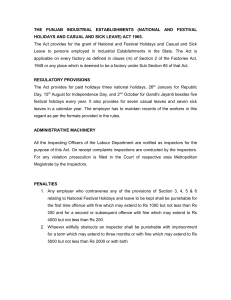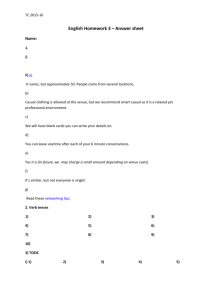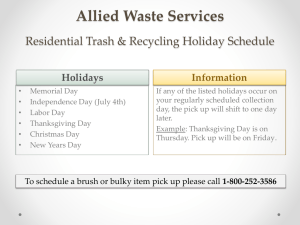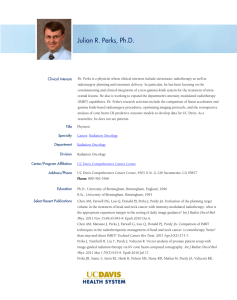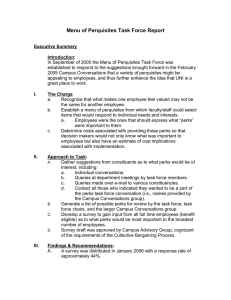Benefits Questions
advertisement
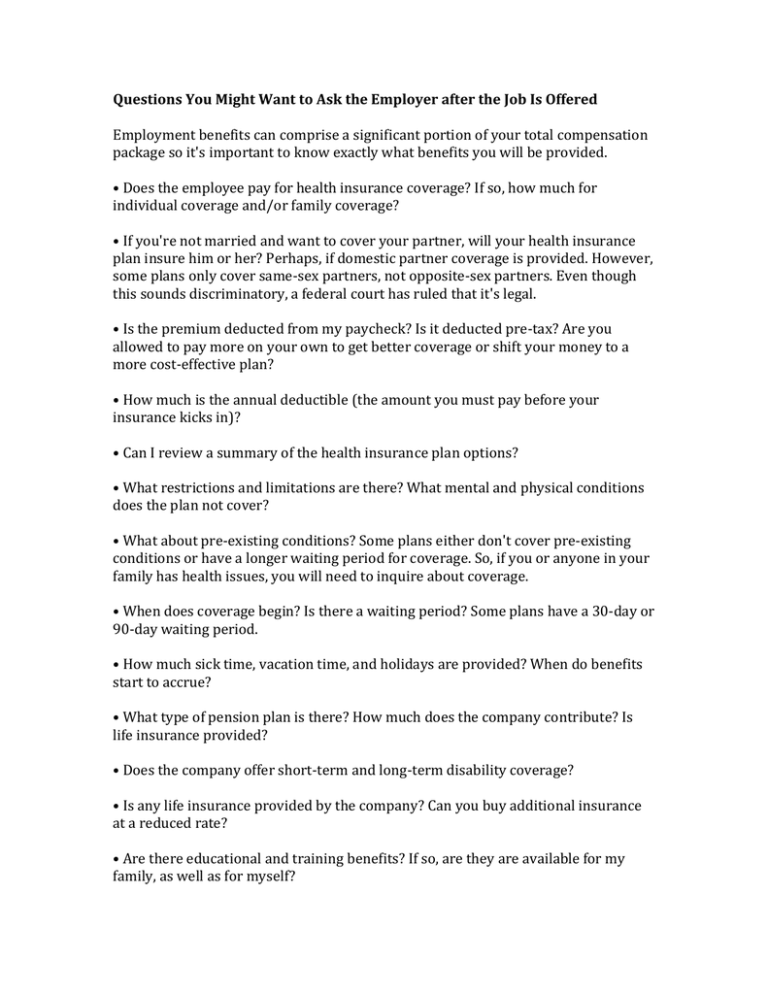
Questions You Might Want to Ask the Employer after the Job Is Offered Employment benefits can comprise a significant portion of your total compensation package so it's important to know exactly what benefits you will be provided. • Does the employee pay for health insurance coverage? If so, how much for individual coverage and/or family coverage? • If you're not married and want to cover your partner, will your health insurance plan insure him or her? Perhaps, if domestic partner coverage is provided. However, some plans only cover same-sex partners, not opposite-sex partners. Even though this sounds discriminatory, a federal court has ruled that it's legal. • Is the premium deducted from my paycheck? Is it deducted pre-tax? Are you allowed to pay more on your own to get better coverage or shift your money to a more cost-effective plan? • How much is the annual deductible (the amount you must pay before your insurance kicks in)? • Can I review a summary of the health insurance plan options? • What restrictions and limitations are there? What mental and physical conditions does the plan not cover? • What about pre-existing conditions? Some plans either don't cover pre-existing conditions or have a longer waiting period for coverage. So, if you or anyone in your family has health issues, you will need to inquire about coverage. • When does coverage begin? Is there a waiting period? Some plans have a 30-day or 90-day waiting period. • How much sick time, vacation time, and holidays are provided? When do benefits start to accrue? • What type of pension plan is there? How much does the company contribute? Is life insurance provided? • Does the company offer short-term and long-term disability coverage? • Is any life insurance provided by the company? Can you buy additional insurance at a reduced rate? • Are there educational and training benefits? If so, are they are available for my family, as well as for myself? • Is the workplace family-friendly? • What is the process for filing claims? Do you have to pay and submit proof of payment before reimbursement, or can you submit claims directly from your physician? How long must you wait before reimbursement? • Can you appeal a negative decision not to be reimbursed? If so, what is the process for filing an appeal? • Does the plan pay for second opinions and preventive tests such as mammograms and Pap smears? • If you are close to retirement age, what impact will Medicaid and Medicare coverage have on your benefits? • Does medical, dental, and hospitalization coverage stop the day you are fired or resign, or is there a grace period (e.g., through the end of the month)? • Can you extend coverage beyond the grace period? • Can you assume any group health policy (this is sometimes referred to as a conversion policy)? • How many paid holidays will you receive? The average number of annual paid holidays is 10. • What is the vacation schedule? The average number of vacation days are 9.4 after a year of service. • Do they offer health club memberships, flexible schedules, day care, tuition reimbursement, on-site dry cleaning? • What is the dress? Casual? Business casual? Casual Fridays? • Do you have the option of flexible work hours? • Can you bring your pet to work; are there concierge services or take home meals? How to Evaluate Perks As you can see there is no standard list of perks that you can measure your job offer against. What you'll need to do is evaluate each offer on its merits--the salary, the benefits and the perks--and determine how those perks will benefit you. One important caveat, never ask these questions during the initial interview. Wait until you have a job offer to discuss employee benefits, either with Human Resources or the person who is offering you the job. A great salary isn't always going to be enough to compensate for an employee benefit plan that doesn't offer what you need.
